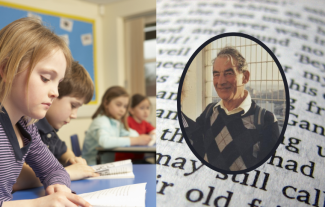Short story: Sing it!

Philip Webb kindly sent us this short story he wrote in 1996, all about a girl who stammers who is asked to read aloud in class.
The shuffling and whispering stopped as Miss Harrison entered the class. This was the lesson that Anne looked forward to all week. Most lessons were facts, boring facts, difficult-to-learn facts — especially when they seemed so useless in real life. But poetry was different. How people felt was so important, and every now and again something would be said in a poetry lesson that set Anne's pulse racing, something expressing a feeling that she felt in her innermost being but could never express in words.
As she left home that morning, the tree surgeons — she wanted to call them 'butchers' — had just arrived and were unpacking the chainsaws that would be used to fell the lovely old beech in the garden opposite that she had known all her short life. Her mother said it had fungus and was dangerous, but Anne knew the fungus had re-appeared year after year and every spring the beech still spread its glorious canopy as luxuriantly as ever. Funny that the poem Miss Harrison had asked them to read over in homework was called 'Throwing a Tree'.
Miss Harrison would normally pick on anyone she fancied to read the first verse aloud in class. His or her neighbour would read the second verse, and so on round the class.
"Come on David, will you start?" she said. Anne's heart sank. That meant she would be next. She hastily looked over the next verse to see if there were any difficult words. Meanwhile David had started:
"The two executioners stalk along the knolls,
Bearing two axes with heavy heads shining and wide..."
Anne was hardly listening, for she had noticed the next verse began: 'Jackets doffed...' How could she possibly manage that?
David was continuing:
"And so they approach the proud tree that bears the death-mark on its side."
Now it was her turn. She would make an effort at it anyway.
"What is the 'death-mark'? Can anyone tell me?" asked Miss Harrison. There were several attempts at answers before someone at the back said it was the 'blaze' painted on a tree to mark it as one to be felled.
Anne knew all that. Hadn't she that very morning seen the death-mark on the tree opposite? But now her thoughts were on the next verse and its difficulties.
"Next verse please," said Miss Harrison. It was Anne's turn. She took a deep breath. Her mouth formed a 'J' and then went rigid. She tried to remember what the speech therapist had told her. "Sing it!"
Quick! She must get it out. But already there was tittering and fidgeting behind her.
"Oh, I see," Miss Harrison smiled at her. "Never mind. Next one, please."
Anne let out her breath in a gasp and felt her cheeks burn with shame and frustration. She bent over the poem and her tears obliterated the words.
* * * * *
The rest of the lesson was lost to her. As soon as it was over she would run out to her favourite tree in the park, sit down there and write some poem about her own doomed beech tree. It would be a sad poem, as all her poems were, but life was like that. Whenever you found someone or something you could trust and admire, it was whisked away. Miss Harrison was alright; she was kind, sympathetic to Anne (who hated her sympathy) and meant well, but she was new and the children played her up. Not at all like Miss Rogers, her predecessor, who was younger and used to glow with delight when Anne was able to show her one of her poems that spoke with real feeling. She had even persuaded Anne to put in for the Wessex Writing Competition her poem about a family of fox cubs found barely alive in their earth after their mother had been hunted to death.
Anne came to with a start. The children were packing away their books. One of them was doing a quiet imitation of Anne, but she didn't care now. Snatching up her sketch book, she dashed out of the room, down the corridor and out into the back drive, from where she could slip out into the park without anybody noticing her.
She was walking fast with her head down to avoid being recognised, when she heard a familiar voice.
"Anne!" It was Miss Rogers coming up the drive. "Just the girl I want to see. Look at this!" and she held out a newspaper.
There, on the front page, was a picture of Anne. Below it was the caption:
"Anne Jerrold, this year's winner of the Wessex Writing Competition."
Without thinking, Anne threw herself into Miss Rogers' arms, half laughing and half crying.
When the first rush of joy was over, Miss Rogers said, "But where were you going, Anne?"
And out it all came: all the griefs and frustrations of the last few months came tumbling out. Miss Rogers listened quietly and then said, "I'm going to see Miss Harrison now. Would you like to come and show her this?"
Copyright 1996, Philip C. Webb
Would you like to submit an article? Fiction or non-fiction, we welcome anything stammering-related. See Submit Something For The Site or email editor@stamma.org for more details.
































